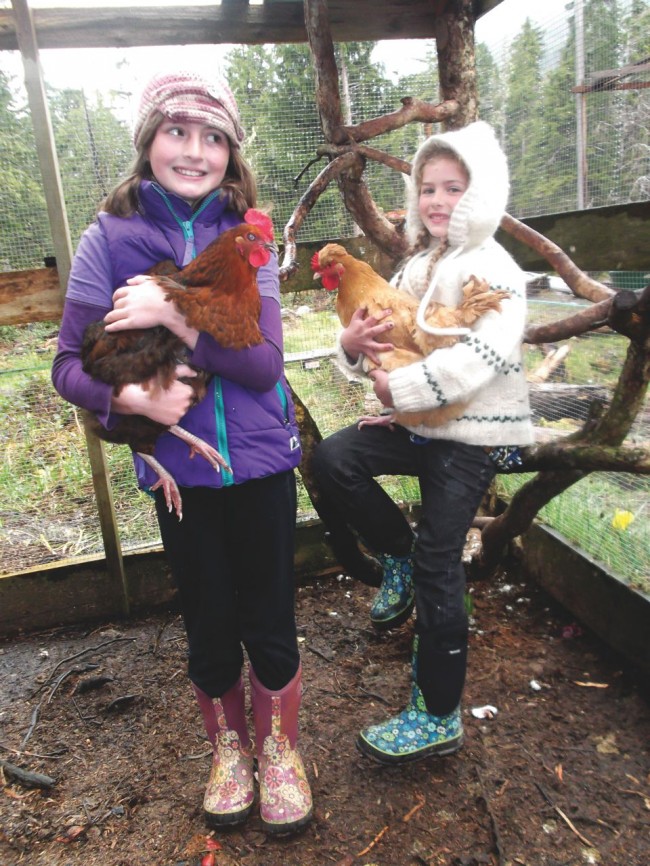
Backyard Chickens: Community Coop-keeping coming into its own?
For some, it’s a stride forward on the road to food security and sustainability. For others, it’s a step away from civilized, modern societies. Some worry about the noise, smells, and pests that might be attracted; others rhapsodize about the soothing sounds of a hens clucking and the benefit of knowing where their food is coming from. Some Canadians have even argued that it’s a Charter right, akin to free speech and liberty.
In the last year, three northern BC towns have seen applications to allow urban residents to keep a few laying hens in backyard coops. It seems that the desire to crack a freshly-laid egg into the morning omelette is growing, and although there are some concerns, many people hope that backyard chickens are in the North to stay.
Within North America, the urban chicken movement has been getting public attention in recent years. Close to 100 US municipalities, including LA and New York, currently allow backyard broods. In Canada, large centres such as Toronto, Winnipeg, and Calgary have been slower to follow suit. However, Vancouver modified city bylaws in 2010 to allow residents to keep a maximum of four hens, and Fredericton, NB just completed a year trial period allowing hens within city limits. Edmonton is considering a similar pilot project, and North Vancouver is in the process of developing urban-chicken-friendly bylaws.
In March of this year, one Calgary chicken-keeper was in front of the Provincial Court of Alberta, citing the Canadian Charter of Rights and Freedoms as well as the 1948 UN Declaration of Human Rights in an argument that keeping hens within city limits is a reasonable way of growing one’s own food.
Legitimate chickens and illicit layers
In northern BC, more people are coming to consider home-raised eggs an inexpensive source of healthy protein and a way to eat locally. Terrace began permitting residents to keep chickens in the spring of 2011; in the spring of 2012, Rupert and Smithers both saw requests to their city councils to amend existing bylaws to allow homeowners to legitimately keep a few hens (noisy roosters excluded) within certain residential areas.
Although one of its main tourist areas is named Cow Bay, Prince Rupert is about as far from farm-animal-oriented as one could imagine. Lot sizes are compact and the spongy, damp ground is not kind to the hooves of herbivores. A bylaw has been on the city’s books for years prohibiting livestock within city limits, including hens.
Student and homeowner Samantha Lewis spearheaded the request to Prince Rupert’s city council. “I always kept chickens growing up,” she says of her childhood on a small farm outside Prince George. “When I moved west, I kept tabs on the urban-chicken movements in other cities.”
Although she was surprised to learn how many Rupertites were keeping illicit layers, Lewis realized that the only real way for her to keep chickens again would be to advocate for change. Her resulting proposal to Council included an affidavit by a current Rupert chicken owner, a petition signed by more than 300 people who supported the change, offers of educational workshops from the local chapter of Transition Towns, and examples of other communities’ hen-friendly bylaws and regulations. “It can be a touchy subject, and it kind of depends on how you broach it,” says Lewis.
Smithers resident Gail Jenne also went before her community’s city council in mid-April to make a similar request as a member of the Groundbreaker’s Collective, a co-op which promotes the production and consumption of local food at fair value. Since part of the co-op’s mandate is to engage Bulkley Valley residents in agricultural activities, Jenne approached council with the hope that they would see the worth in the proposal.
“Chicken manure is just great for the garden,” says Jenne, “and with what you can feed them, kitchen compost and whatnot, chickens really cut down on the amount of waste that gets dumped at the landfill.” In order to alleviate concerns about inexperienced residential chicken owners, she suggested that interested individuals have access to educational opportunities. “Before you’d get your ‘chicken ticket,’” says Jenne, “you’d take a class on how to raise a healthy hen.”
Licensed coops
Both Lewis and Jenne hoped that their city councils would be as receptive the idea of gently cooing hens in backyard pens as was Terrace, which legalized keeping chickens in certain residential zones in 2011. Homeowners must register their coops with the city—akin to licensing a dog—and abide by stipulations as to lot size, coop construction and maintenance. Tara Irwin, the city’s Sustainability Coordinator, says that prior to the bylaw change, city staff were aware that a number of people already kept chickens in Terrace, but that allowing backyard hens was also in line with sustainability assessments conducted between 2009 and 2011.
“The city wants to support residents in obtaining or growing more food locally and sustainably,” says Irwin—so as part of the development of those policies, the city precipitated the change from within. Irwin makes note, however, that a number of enquires about keeping hens certainly didn’t hurt. “Overwhelmingly, the people who came forward were in support,” says Irwin, “although we definitely didn’t go into it without research.”
Irwin and other city staff spoke to municipal counterparts elsewhere in the province that already permitted backyard chickens to find out what procedures they had implemented, and also to hear about the problems that had emerged over time. “One of the concerns was: what if we get this huge influx of applicants once it is legalized?” says Irwin. However, in speaking to Victoria, which has allowed residents to keep chickens in their yards for many years, she learned that that community had only had approximately 60 applications in a city of more than 500,000 people.
“The number of complaints was tiny, too,” adds Irwin, “something like a total of two.”
Concerns about the potential impact of small broods of laying hens tend to centre on a few basic points: odour, noise, pests, predators, and the health of the birds themselves. Lewis, Irwin, and Jenne all maintain that, with proper maintenance and care, keeping a few chickens is no more dangerous or malodourous than having any other pet.
“There’s a good weekend push involved to build the coop,” says Irwin, “but daily, maybe 15 minutes is required, including gathering eggs.” Lewis compared the decibel level of a chicken’s cluck (70 decibels) to the bark of a dog (100 decibels). In Rupert, councillors worried about flocks of abandoned hens competing for space with the currently problematic feral cat population. “I can guarantee you,” Lewis said at her council presentation, “the hens wouldn’t last long.”
Prince Rupert city council, after receiving Lewis’ application, contacting other municipalities and investigating the proposal further, approved the bylaw amendment in late June. In Terrace, Irwin says her office will continue to promote food security and encourage residents in any way they can. Surprisingly for Smithers, a community known for local sustainable ventures such as its farmer’s market and car-share co-op, council voted not to pursue any changes to existing bylaws at this time. “I was told ‘it’s not what you do in a city,’” says Jenne, who nonetheless plans to regroup and make the proposal again in the future.
Clearly, as more municipalities explore the idea of backyard hens within their city limits, that kind of dismissive argument may be on its last legs.



